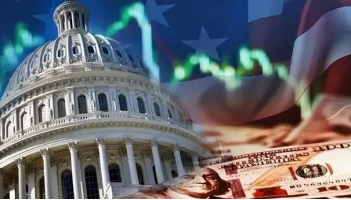After the holiday, the U.S. stock market fell sharply, and recession fears loomed over the market. Investors remained concerned about a possible U.S. recession and stubborn inflation, offsetting optimism about U.S. measures to reduce inflation. U.S. consumer prices are far from peaking, with inflation soaring to 8.6% in May, leaving little room for the Fed to slow monetary tightening.
Joachim Klement, head of strategy at British investment bank Liberum Capital, said: "The Fed is likely to continue to aggressively fight inflation for now. At the same time, European economic growth is slowing down rapidly. This will only increase concerns about U.S. economic growth."
Can oil withstand slowing global growth? Right now, oil is in the midst of a massive supply and demand war. Signs of tight supply, news of a weekend strike in Norway and a production shutdown in Libya, coupled with optimism over the reopening of the economy, pushed oil prices up $3. But now, U.S. oil has fallen nearly $3 to $105.44 amid concerns about global growth. There are signs of strain on the demand side due to high prices. The latest drop erased gains from the past two days. Friday's low of $104.55 a barrel is now in focus.
Oil prices fell alongside the broader stock market after being pressured by the growing risk of an economic slowdown. Citi previously said crude oil prices could fall to $65 this year in the event of a recession. JPMorgan's most optimistic forecast was $380 a barrel.
Recession fears and a lack of liquidity pushed Treasury yields lower. U.S. 10-year Treasury yields could fall to the 2.70% area in the coming days. Sentiment in financial markets was little lifted after the long weekend. The factors that drove the 10-year yield to 2% in late June remain in place today. Demand from fund managers, real-money accounts and asset managers pushed Treasury prices higher. There were no treasury bill offerings until July 11, and market liquidity was very low as many investors were still furloughed.
Dennis Kissler, senior vice president of financial trading at Bank of Korea, said: “With recession fears still lingering, the Dow and the S&P 500 will be the main factor affecting crude oil in the near term. Fundamentally, there are concerns that fuel demand may be will drop significantly with the end of the Independence Day holiday on July 4th.
Goldman Sachs echoed concerns among German officials that Russia's Nord Stream 1 pipeline, which transports natural gas to Europe, may not return to full capacity after maintenance is completed in July. Goldman Sachs raised its forecast for European gas prices through next year, citing rising supply risks. Goldman Sachs raised its forecast for benchmark European gas futures prices in the third quarter to €153/MWh, although it sees a complete shutdown of Russian supply as unlikely, as it would slash revenue vital to Moscow Time. Prices could top €200/MWh in a "worst-case scenario" of gas delivered by the Nord Stream pipeline.
European stocks extended their losses, erasing earlier gains, as investors awaited corporate earnings reports to see if corporate profit growth could withstand soaring inflation and tight supply. The Stoxx Europe 600 fell more than 1.4 percent, with economic-sensitive sectors such as basic resources and autos among the top losers as recession fears persisted. Profits are the next major catalyst for stocks, with Citigroup's Europe ex-UK index showing analysts are lowering their high expectations for corporate profits.
The euro fell to a 20-year low against the U.S. dollar EUR/USD, with traders betting that the European Central Bank's pace of interest rate hikes will slow as the European economy threatens to slip into recession.
Neil Jones, head of foreign exchange sales at Mizuho, said: Parity is now only a matter of time. Hard to find positive reviews for Euro. The euro is expected to parity with the dollar this year. The ECB is expected to stick to its stance that it will only see a quarter-point rate hike in July and wait for faster tightening in September, while other countries are raising rates much faster. Rising yields also offered little support.
 2022-07-07
2022-07-07
 1222
1222







 简体中文
简体中文
 ภาษาไทย
ภาษาไทย
 繁體中文
繁體中文
 Indonesia
Indonesia











